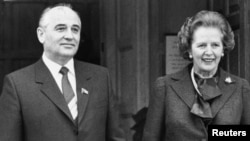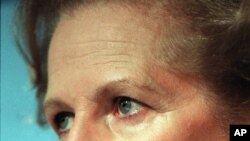Former British Prime Minister Margaret Thatcher, experts say, will best be remembered for the tough free-market economic measures she undertook during her 11 years in office [1979-90] — measures that can only be described as bringing an economic revolution in Britain.
But Thatcher, who died Monday at age 87, also played an important role on the international stage, especially at a time of Cold War tensions between the Soviet Union and the West.
Tim Bale, a British historian of the Conservative Party, said Thatcher was the first Western leader to realize that Mikhail Gorbachev might be a different kind of Soviet politician.
Greeting Gorbachev
“When she first came in in 1979, she took a very, very strong anti-communist attitude and really didn’t want anything to do with the Soviet leadership,” said Bale. “But she recognized very early on that Mikhail Gorbachev was something different. And to her credit, she pursued the relationship with him, even when some people thought she was perhaps being naively taken in.”
In December 1984 — three months before Gorbachev became the Soviet leader — he was in London as the head of a parliamentary delegation. He was invited to meet Margaret Thatcher, who later said “this is a man we can do business with.”
Stephen Jones, a Russia expert at Mount Holyoke College, says those words were critical.
“I just actually was reviewing an article that Gorbachev wrote, an obituary of Margaret Thatcher, in which he said that phrase actually helped him in terms of getting some greater credibility with Western leaders,” said Bale. “If Margaret Thatcher could deal with him, then the rest of the European leadership, and of course the American leadership, could deal with him too. So that was quite an important step in preparing the world for Mikhail Gorbachev.”
A bond with Reagan
Thatcher also had a very close relationship with President Ronald Reagan. They were, as some experts described them “politically kindred spirits.”
Richard Allen, former National Security Adviser under President Reagan, met her numerous times.
“I consider her to be one of the most remarkable people of the century. She was a thoroughly dedicated, highly intelligent, principled person whom most Americans admired greatly. She was cordial, serious — always serious. And those were reasons that Ronald Reagan was attracted, across the board, to her domestic thinking as well as her foreign policy thinking.”
“Hand in hand with Ronald Reagan," said historian Bale, "she was very instrumental in upping the spending on arms that eventually bankrupted the Soviet Union and forced it to withdraw from its empire in Central and Eastern Europe and then eventually, of course, implode itself.”
German reunification
While seeing eye to eye with Reagan on how to deal with the Soviet Union, Thatcher disagreed with President George H.W. Bush on German reunification.
Retired General Brent Scowcroft, Bush’s National Security Adviser, said, “We and [West German Chancellor] Helmut Kohl and most of the Germans were the only ones who really wanted German reunification. The Soviet Union didn’t want it. The French didn’t want it. And the British, Margaret Thatcher said: ‘I like Germany so much I think there ought to be two of them.’ This was a balancing act to manage the process, ending up in German reunification where most of the world’s powers were not in favor of it.”
Robert Legvold of Columbia University says Thatcher had concerns about how powerful Germany could become within Europe.
“The Germans knew that both the British and the French were nervous about the prospect of German reunification, but she wasn’t digging in her heels in on that,” said Legvold. “And when the process moved almost of its own speed and course, she’s not somebody who tried to stick a stick in the spokes of that wheel.”
Experts agree that Thatcher was a towering leader of the 20th century — and, as the Financial Times said, she “remains the figure against whom all subsequent British politicians should be measured.”
But Thatcher, who died Monday at age 87, also played an important role on the international stage, especially at a time of Cold War tensions between the Soviet Union and the West.
Tim Bale, a British historian of the Conservative Party, said Thatcher was the first Western leader to realize that Mikhail Gorbachev might be a different kind of Soviet politician.
Greeting Gorbachev
“When she first came in in 1979, she took a very, very strong anti-communist attitude and really didn’t want anything to do with the Soviet leadership,” said Bale. “But she recognized very early on that Mikhail Gorbachev was something different. And to her credit, she pursued the relationship with him, even when some people thought she was perhaps being naively taken in.”
In December 1984 — three months before Gorbachev became the Soviet leader — he was in London as the head of a parliamentary delegation. He was invited to meet Margaret Thatcher, who later said “this is a man we can do business with.”
Stephen Jones, a Russia expert at Mount Holyoke College, says those words were critical.
“I just actually was reviewing an article that Gorbachev wrote, an obituary of Margaret Thatcher, in which he said that phrase actually helped him in terms of getting some greater credibility with Western leaders,” said Bale. “If Margaret Thatcher could deal with him, then the rest of the European leadership, and of course the American leadership, could deal with him too. So that was quite an important step in preparing the world for Mikhail Gorbachev.”
A bond with Reagan
Thatcher also had a very close relationship with President Ronald Reagan. They were, as some experts described them “politically kindred spirits.”
Richard Allen, former National Security Adviser under President Reagan, met her numerous times.
“I consider her to be one of the most remarkable people of the century. She was a thoroughly dedicated, highly intelligent, principled person whom most Americans admired greatly. She was cordial, serious — always serious. And those were reasons that Ronald Reagan was attracted, across the board, to her domestic thinking as well as her foreign policy thinking.”
“Hand in hand with Ronald Reagan," said historian Bale, "she was very instrumental in upping the spending on arms that eventually bankrupted the Soviet Union and forced it to withdraw from its empire in Central and Eastern Europe and then eventually, of course, implode itself.”
German reunification
While seeing eye to eye with Reagan on how to deal with the Soviet Union, Thatcher disagreed with President George H.W. Bush on German reunification.
Retired General Brent Scowcroft, Bush’s National Security Adviser, said, “We and [West German Chancellor] Helmut Kohl and most of the Germans were the only ones who really wanted German reunification. The Soviet Union didn’t want it. The French didn’t want it. And the British, Margaret Thatcher said: ‘I like Germany so much I think there ought to be two of them.’ This was a balancing act to manage the process, ending up in German reunification where most of the world’s powers were not in favor of it.”
Robert Legvold of Columbia University says Thatcher had concerns about how powerful Germany could become within Europe.
“The Germans knew that both the British and the French were nervous about the prospect of German reunification, but she wasn’t digging in her heels in on that,” said Legvold. “And when the process moved almost of its own speed and course, she’s not somebody who tried to stick a stick in the spokes of that wheel.”
Experts agree that Thatcher was a towering leader of the 20th century — and, as the Financial Times said, she “remains the figure against whom all subsequent British politicians should be measured.”






